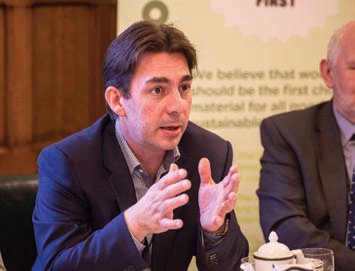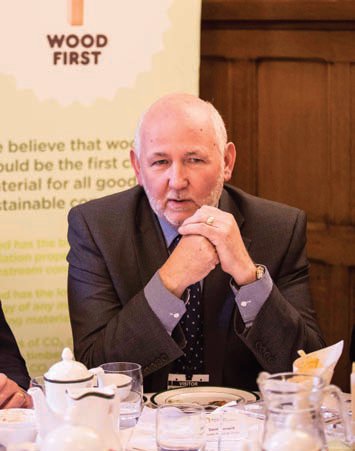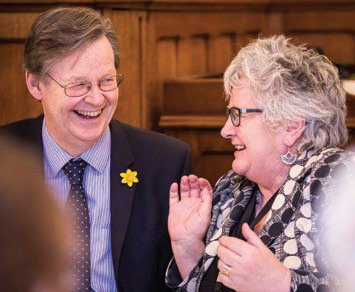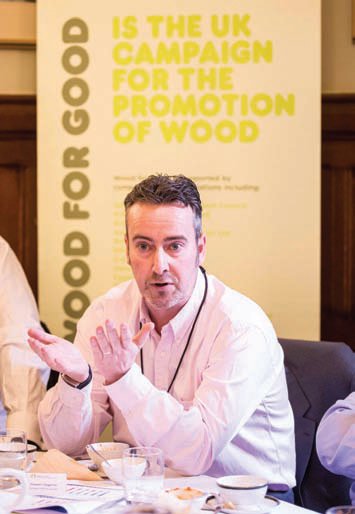Timber’s pitch to parliament
5 April 2014A roundtable policy debate at the House of Commons revealed construction industry support for timber but the MPs were less vocal.
Wood for Good, the UK's wood promotion and sustainability campaign, hosted a roundtable policy debate at the House of Commons on March 26 to discuss and raise awareness of timber's value as a sustainable construction material. The theme was "Decarbonising construction: Timber's role in a sustainable built environment".
The key invitees were MPs from all parties, but the roundtable was also attended by representatives of the construction industry, Timber Trade Federation chief executive John White and Wood for Good campaign director David Hopkins.
The event, which it is hoped was the first of a series of roundtables targeting different timber and construction sector stakeholders and decision makers, followed a survey of MPs commissioned by Wood for Good. This, said Mr Hopkins, showed a stunning level of ignorance among policy makers about timber and a desperate need to promote the supply chain for all the benefits it brings.
"The construction industry is as much shaped by policy frameworks as market players and actors within, but when it comes to public and political debates around sustainable construction, timber barely gets a mention," said Mr Hopkins.
"The sector has a great story to tell in terms of its potential contribution to improving the overall built environment, in particular by reducing construction carbon emissions through embodied carbon in building materials and the energy efficiency of finished structures. As buoyancy returns to the market it is imperative we get our message across."
Environmental sustainability
The participants were asked why, as revealed in the MPs' poll, was environmental sustainability considered such a low priority for building.
David Hopkins, Wood for Good: "There is a lot of confusion because sustainability is often seen as an expensive add-on by many. That's quite different with timber. Sustainability is an integral aspect of the timber construction sector. From forestry to factory, to the fact that wood is a lightweight, low carbon, high performance material, sustainability is the defining aspect through the supply chain.
Trees require nothing but sunlight and rainfall to grow, while absorbing carbon dioxide and releasing oxygen. Processing and manufacturing is relatively low energy, while finished wooden buildings are thermally efficient and of the highest performance standards.
"The UK is leading the way on modern timber construction - we have had two of the tallest timber buildings, a lot of the new academy schools are being built with timber because it is faster and higher spec than competing materials."
John White, chief executive, Timber Trade Federation: "In making the case for timber it's key we highlight how the trees themselves are sustainably produced. On the basis trees suck carbon out of the atmosphere and store it, timber is the greenest construction material known to man."
Charlie Law, head of environmental management at BAM, one of the UK's largest contractors: "We have to remember sustainability is not just about the environment but about the social and economic side too.
Timber compares well with other materials on both of these fronts. Let's not forget, steel uses materials mined on the other side of the world and imported here to be processed."
Biomass and price
Anne McGuire, chair of the all-party group on the wood panel industry: "We've been looking at the competitiveness of the UK [panels] market and there is a belief it is being partially impacted by the effect of biomass use and subsidies. Is the subsidy regime also skewing the market in terms of timber prices? If so, there is a lack of awareness that it is having this sort of effect."
Baroness Maddock, Liberal Democratic peer: "There are also wider international concerns on what is happening in terms of the development in the biomass sector, including at the UN."
Stewart Dalgarno, director of product development, Stewart Milne Group: "The market should be trying to get the maximum value out of wood rather than turning it into wood pellets for biomass. We want to promote renewable and low carbon technology but, as a homebuilder, putting investment in a good fabric-first, or wood-first approach to save energy should be a priority."
Gary Newman, executive chair, Association for Sustainable Building Products: "We need a cascade approach to ensure that materials are used for their longest physical lifespan before choosing the best end-of-life options.
Carbon reduction and renewables
Angela Smith MP, member of the all-party group on rural services: "I feel there is a tension between renewable targets on the one hand and carbon reduction targets on the other. Consideration of a renewables target seems to screen out consideration of carbon reduction targets."
Stewart Dalgarno: "It's about striking the right balance."
John White: "Allowable solutions, the government's scheme to promote zero-carbon homes, don't yet allow for the material benefit of timber to be a viable solution for reducing carbon."
David Hopkins: "More and more local councils are taking this on board since our Wood First campaign. Hackney was the first local planning authority to accept that there was more carbon stored within the fabric of a large timber building than could be displaced through the installation of renewables over their 25-year life span. That has taken off now. More and more councils are doing this. We see the results in the projects coming through the Wood Awards. Embodied carbon is a big issue and timber can really help."
Perception of timber
Angela McGuire: "In Scotland there seems to have been a fairly substantial switch to timber construction; why is this?"
Baroness Maddock: "The problem is there is often a negative perception of timber construction from builders who aren't familiar with it so don't promote it."
Timber in construction
David Renwick, CEO Ocean Housing: "As a company we made a transition to timber construction over 10 years ago. The reason being was largely because of a skills shortage. Ten years ago it was difficult to find anyone to lay a brick. The skills shortage pushed up prices and that pushed us to look at alternative methods, finding timber to be the best option in terms of price and sustainability."
"When we talk about the survey results, nobody has made the association between cost and speed. The biggest saving is the speed. Reduced construction times mean reduced costs. A key factor to promote such construction is to emphasise that the lifetime and future maintenance costs would be lower than they otherwise would be."
Sir Robert Smith MP: "That's all well and good if an accountant was buying a home, but what about the average the house buyer; do they go beyond the bottom line?"
Roger Williams MP: "It's the big developers who need to be convinced as they are the ones who actually build the houses."
Baroness Maddock: "Surveyors and banks also put people off from doing something non-traditional."
Market penetration
Anne McGuire asked why timber's penetration in the English market wasn't deeper and there was strong agreement that this was because of negative perceptions.
Charlie Law: "There is beginning to be a change in attitude now but, people build to what is in the regulation, so there needs to be a change to promote sustainable materials at that level."
Stewart Dalgarno: "The financial downturn hasn't helped as a lot have reverted to type and gone for the cheapest option or the option they know. But in the last 18 months there has been a substantial increase in orders and things are looking very healthy."
David Hopkins: "What's really disappointing is when you see announcements like Ebbsfleet garden city which has nothing about quality or environmental performance. It could easily be so much better."
Conclusion
In conclusion there was strong consensus on the need to emphasise the sustainability of timber and Angela Smith MP called for political consensus and leadership on the issue.
Gary Newman: "There is a massive untapped sustainability win in using more timber, especially UK grown timber."
Stewart Dalgarno: "Put fabric first policy in Building Regulations and a stimulus to promote low energy and low carbon homes."
Jim Paice MP: "Renewable subsidies are acting to skew the market, there should be more thinking on how policy actually impacts on markets."
Anne McGuire: "We need better access to information on timber builds. Free and easy for all."
Sir Robert Smith: "You can rely on markets up to point but that regulation has to drive the use of materials".
Charlie Law: "Growth in the sector would be a boost to the rural economy and to industry in areas such as the north of England and Scotland.
 Charlie Law: Sustainability is not just about the environment but about the social and economic side as well”
Charlie Law: Sustainability is not just about the environment but about the social and economic side as well”
 David Renwick: “The skills shortage pushed us to look at alternative methods, finding timber to be the best option in terms of price and sustainability”
David Renwick: “The skills shortage pushed us to look at alternative methods, finding timber to be the best option in terms of price and sustainability”




